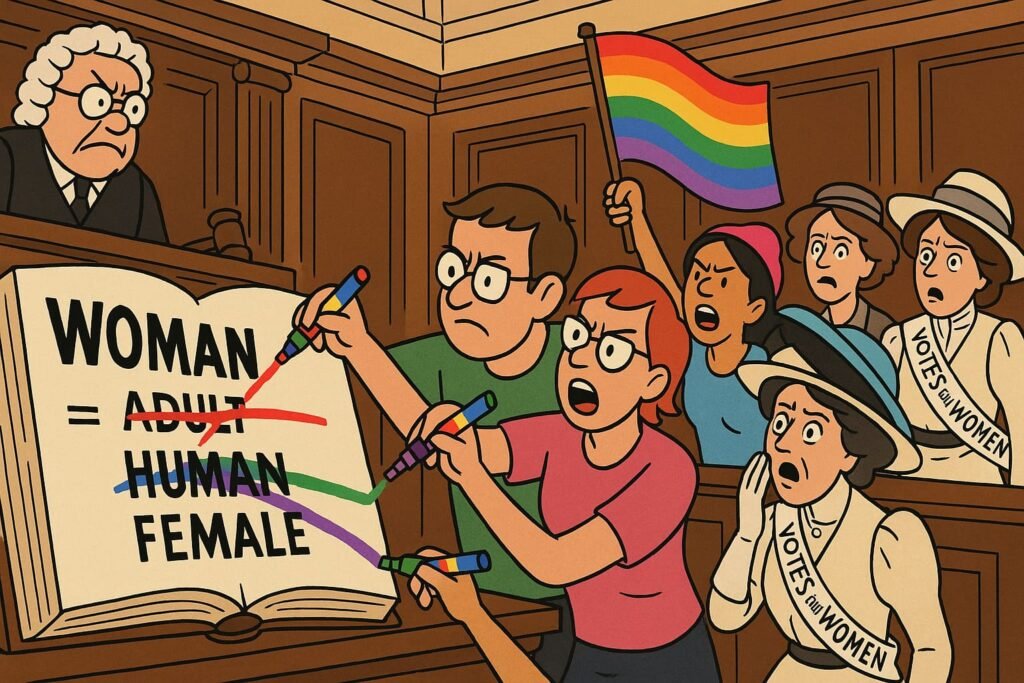Women’s Rights – Without Biology, the Word ‘Woman’ Fades
From Rights to Vanishing Definitions
For centuries, women fought for recognition — the vote, education, protection from exploitation, and equal opportunities. These battles were rooted in the biological reality of being female.
But today, the very category “woman” is being hollowed out. When law, policy, and culture replace biological sex with self-declared gender, the definition of “woman” starts to vanish. Without sex, women’s rights become abstract — a label anyone can claim, and therefore one that protects no one.
What Are Women’s Rights?
At their core, women’s rights exist because biological differences matter:
- Women’s bodies meant exclusion from politics, education, and paid work.
- Women faced unique risks in reproduction, health, and safety.
- Female-only spaces were built for privacy and protection.
Erase “sex,” and these foundations collapse. Women become just another “identity,” interchangeable with self-declared labels.
How the Definition Shifted
- Gender Theory reframed “woman” as a social role, not biology.
- Queer and Trans Theory pushed further: gender is self-declared, biology irrelevant.
- Policy and Law followed: documents, sports categories, and public services began replacing sex with gender identity.
What was once a material category now floats as an idea — detached from reality, but shaping policy all the same.
Where Women’s Rights Get Undermined
- In Law: Sex-based protections (like equality acts or anti-discrimination clauses) lose force when “woman” is undefined.
- In Sport: Female athletes face male-bodied competitors under “inclusion” policies.
- In Prisons and Shelters: Women lose safe spaces to self-declared entrants.
- In Health and Data: “Pregnant people” replaces “mothers,” erasing language tied to female biology.
Each step chips away at rights built specifically for women’s safety, dignity, and equality.
Why Institutions Go Along
- Academia: Gender Studies thrives on dismantling categories.
- Politics: Leaders duck hard debates by redefining terms.
- Corporations: Diversity pledges and “inclusive” branding sound good without costing money.
- Activists: A blurred definition of woman guarantees endless campaigns.
The result? Women’s rights become bargaining chips in identity politics.
Consequences
- Legal Confusion: Rights become impossible to enforce if categories aren’t clear.
- Loss of Protection: Women-only spaces dissolve under pressure.
- Division: Feminists split between defending sex-based rights or embracing identity.
- Distraction: Real issues like pay gaps, childcare, and violence are drowned out by identity battles.
Why It Matters
Women’s rights weren’t gifts — they were fought for, won, and enshrined in law. But if “woman” loses meaning, those protections are reduced to slogans.
Equality only works if rights are grounded in reality. And reality is biological sex.
From Recognition to Erasure
The category “woman” once symbolised progress. Today, it risks becoming meaningless. If anyone can claim it, then women as a class disappear — and so do their rights.
The irony? Erasing sex in the name of inclusion ends up excluding the very group women’s rights were built to protect.
→ Link to Sex in Law (legal basis), Fairness in Sport (application), Women’s Spaces (real-life impact), Feminism (historical struggle).
Visit our Women & Biology Explainer Hub to see how law, sport, rights, and safeguarding all collide with ideology.
FAQ: Women’s Rights
What are women’s rights?
Legal and social protections built around the biological reality of being female.
Why do they depend on biological sex?
Because protections like safe spaces, maternity rights, and sports categories exist for female bodies, not self-identities.
How are women’s rights undermined today?
By replacing “sex” with “gender identity” in law, policy, and culture.
Who benefits from redefining women?
Academics, activists, politicians, and corporations that gain moral credit — but not women themselves.
What’s the risk?
That “woman” becomes a meaningless label, leaving female rights unenforceable.



